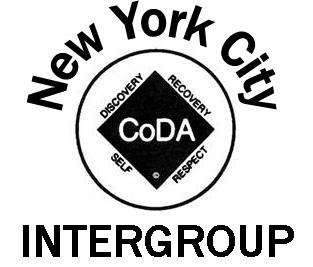 |
A Twelve Step self-help program for Co-Dependents |
| Click on a Step below to see the readings and exercises for that Step. Step 1 Step 2 Step 3 Step 4 Step 5 Step 6 Step 7 Step 8 Step 9 Step 10 Step 11 Step 12 |
CoDependents Anonymous (CoDA) in New York City This web site has been provided by NYC CoDA Intergroup Working the 12 Steps of CoDependents Anonymous (CoDA) © 2005 NYC CoDA Intergroup. All rights reserved. The CoDA 12 Steps and 12 Promises are © Co-Dependents Anonymous, Inc. The Twelve Steps and Twelve Traditions have been reprinted and adapted with permission of Alcoholics Anonymous World Services, Inc. Permission to reprint and adapt this material does not mean that AA has reviewed or approved the content of this publication, nor that AA agrees with the views expressed herein. AA is a program of recovery from alcoholism only – use of the Twelve Steps and Twelve Traditions in connection with programs and activities which are patterned after AA, but which address other problems, does not imply otherwise. Step 7 Co-Dependents Anonymous Step 7: “Humbly asked God to remove our shortcomings.” Co-Dependents Anonymous Promise 7: “I am capable of developing and maintaining healthy and loving relationships. The need to control and manipulate others will disappear as I learn to trust those who are trustworthy.” Suggested Reading CoDA Blue Book pp. 53-56. 12 Step Handbook: Step 7 Chapter, pages 31-33. “CoDA 12 Steps & 12 Traditions Workbook – Steps 7,8,9” : Step 7 is pages 9-11. CoDA “Making Choices” Booklet, which was written especially for those working Steps 6 and 7. CoDA Affirmations Booklet Exercises These exercises can help you work the 7th Step. In other words, they allow you to get into the feelings and specifics and not just rush through the Step. Keep the task manageable; set safe boundaries for yourself. For example, set aside an amount of time that feels comfortable to you to work the Step on a given night. Keep it simple. Consider “book-ending” with your Step work. Book-ending means telling someone, or your meeting, that you plan to do something, then telling them afterwards that you did it. It can help you show up for yourself. Finally, be gentle, and remember that reading and writing about a Step are an important part of working the Steps. 1. Without editing or over-analyzing, write about “what the 7th Step means to me.” 2. Review the questions on page 11 of the “CoDA 12 Steps & 12 Traditions Workbook – Steps 7,8,9” . Use any that feel right. 3. Why is the 7th Step necessary? Why are Steps 6 and 7 separate Steps, instead of just being one Step? 4. Why is humility necessary for this step? What does humility mean to you? Write about that. 5. What does humility feel like? 6. Is humility difficult for you? How is controlling related to humility and “humbly asking”? 7. What are “shortcomings”? What does that word mean to you in this context? Can you define it in a way that is helpful without being shaming? 8. What is God’s role in this step, and what is yours? 9. How will you “humbly ask” God to remove your shortcomings? Is there some special way, some ritual or prayer you can use? What feels right? 10. How is the 7th Step related to the 7th Promise? 11. Exercise: Take the 7th Step prayer (in the CoDA book on pp. 54-55) and in place of “all my shortcomings” substitute one particular shortcoming, such as controlling or judging. Recite the prayer all the way through for that particular shortcoming. Take your time, doing one at a time, perhaps even just taking one shortcoming on a given day. (Example: “In this moment I ask my HP to remove judging, relieving me of…”) 12. Exercise: Using Affirmations – Affirmations can help with the 6th and 7th Steps. Positive statements give our unconscious something healthy to focus on, which takes attention away from our defects. To replace “negative messages of the past with positive messages of recovery,” try the following exercise: (a) Take one shortcoming (or “character defect”) (b) Imagine what positive qualities will exist in you after God removes the shortcoming (c) Create or find affirmations using those positive qualities. Repeat steps a-c for each shortcoming. Then assemble a list of your affirmations and recite them to yourself regularly, especially when a particular defect comes up. Example: with Judging out of my life, I imagine I’ll be accepting and loving. So Acceptance and Love become my affirmation themes and I write: “I accept people exactly as they are,” and, “Every day I am surrounded by God’s children.” Note: in addition to writing your own affirmations, many helpful ones can also be found in CoDA literature. If you want to be on our email list to receive updates on upcoming CoDA events in New York City, please write to anicko2794@yahoo.com For more CoDA info, go to www.codependentsnyc.org or call 646-289-9954 For more information on the program of CoDependents Anonymous, visit the CoDA World Fellowship web site at www.coda.org |